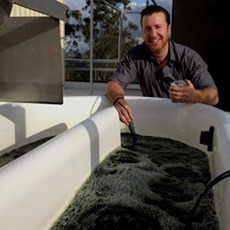Biofuel production from Australian algae
Native species of algae have been identified as potential candidates for the development of cheap, efficient and commercially viable alternative fuels. The fast-growing and hardy microscopic algae were discovered by Dr Evan Stephens and the team at the University of Queensland’s (UQ) Institute for Molecular Bioscience, in collaboration with Germany’s Bielefeld University and Karlsruhe Institute of Technology.
Algae oil has recently become the focus of an emerging biofuel industry, though viable commercial production is yet to be achieved. Dr Stephens explained that previous research has focused on seeking oil-rich algae, “but usually these are not fast-growing and they are tastier to predators”.
“The integration of new technologies means we can turn a broad range of algae into biocrude oil that can be processed in existing oil refineries,” he said.
“A major new frontier is in the biology and developing new strains - and we’ve already made significant advances through the identification of high-efficiency strains that have really stable growth, as well as being resistant to predators and temperature fluctuations.”
Dr Stephens and the team identified hundreds of native species of microscopic algae from freshwater and saltwater environments around Australia. They then tested these strains against thousands of environmental conditions in the laboratory, creating a shortlist of top performers. The researchers are now putting the algae through their paces at a pilot processing plant in Brisbane, which opened in April.

“While we know that we can produce algae oil that is even higher quality than standard petroleum sources, we are working to increase the efficiency of production with the ultimate aim being to compete with fossil fuels dollar for dollar,” said Dr Stephens.
He said it is important to get the economies of scale right before commercialising algae biofuels, because despite what some people might think, “the industry is clearly maturing. There are still important challenges in science and engineering to be overcome to achieve the high efficiency needed to compete with conventional petroleum.”
But Dr Stephens has high hopes for the future of the industry, suggesting that Australia’s climate and land could make it an ideal candidate for algae farming.
“If we devoted just 1% of our land mass to algae farming, we could theoretically produce five times more oil than we currently consume and potentially become an oil exporter, rather than an importer - we could be like the Middle East,” he said.
The project has garnered investment from the Queensland Government, Cement Australia, Siemens, Finland’s Neste Oil and global engineering company KBR.
Liquid catalyst could transform chemical manufacturing
A major breakthrough in liquid catalysis is transforming how essential products are made, making...
How light helps plants survive in harsh environments
Researchers from National Taiwan University have uncovered how light stabilises a key...
SKA-Low's first image of the universe released
The image is an indication of the scientific revelations that will be possible with the...




